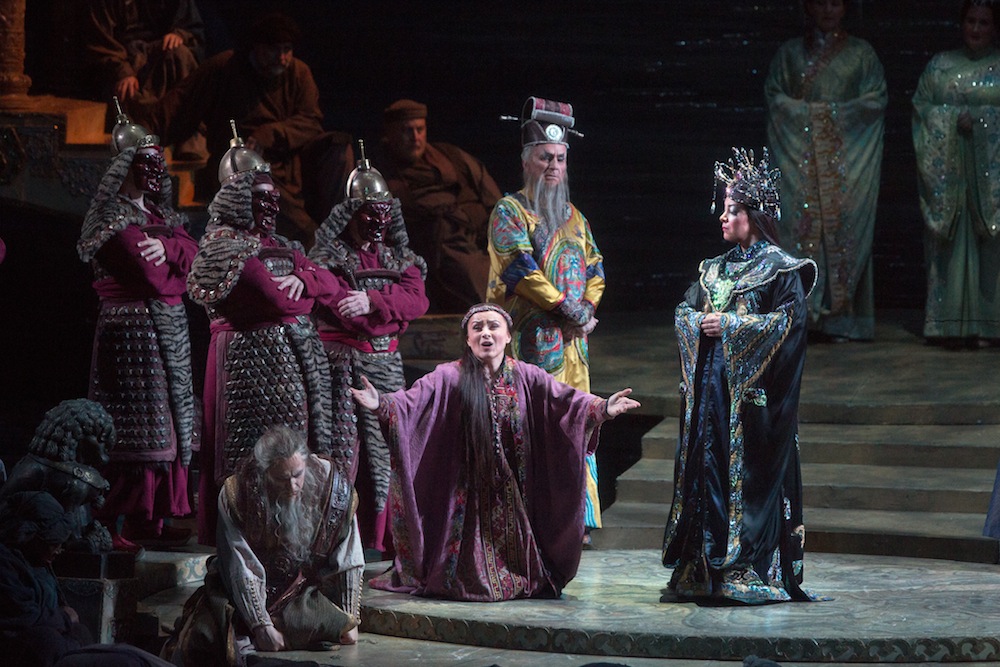Sopranos, orchestra bring fresh gleam to Met’s “Turandot”

Anita Hartig as Liu and Nina Stemme in the title role of Puccini’s “Turandot” at the Metropolitan Opera. Photo: Marty Sohl
There are but two Franco Zeffirelli productions left in the Metropolitan Opera’s standard repertory, and while it is hardly unheard of to see them both in a short span, it isn’t every week that a pair of decades-old revivals seem so fresh. Following the success of last Wednesday’s Bohème, the Met on Monday presented Turandot, Puccini’s mythical Chinese romance, in all its gilded glory.
Act I, with its thrilling choreography, is brilliant theatrical spectacle (though it’s admittedly odd to see that this particular example of Italian “orientalism” has survived the latest round of PC purges in the arts). The Emperor’s palace is one of the most blindingly opulent scenes the Met has to offer—even if it seems like the probable result of asking Bernini to design a Chinese temple.
The staging is far less successful at grappling with what is admittedly a tricky aspect of the piece itself—the intimate moments between the star couple in Act III (left unfinished by Puccini) are unconvincing, leading to a less than completely satisfying resolution.
This was of little concern to Nina Stemme, who, to her credit, showed true vulnerability in this crucial exchange, but mostly leaned on the imposing power of the title role to create a fiercely menacing interpretation. After pushing too hard in the opening lines of “In questa reggia,” she quickly reined in her voice to produce focused, intense sound as she lashed out her famous riddles. She made an intimidating presence, hard as iron; it was not difficult to understand how she could make her parade of would-be suitors cower.
It was Monday’s Liù, though, who won the audience’s most ecstatically proclaimed affections. This is the second Puccini role for Anita Hartig at the Met, and she was even more impressive here than she had been in her debut as Mimì two seasons ago. From her very first moments, it was clear that she had crafted a complete vocal and dramatic character, communicating the urgency of her tormented love through ravishing singing. Hers is a voice of color and body, essentially light-lyric. A silken tone, shimmering vibrato, and considerable vocal power were all clear in her pleading first aria, “Signore, ascolta.” This truly is a voice capable of soaring gloriously through the Met’s cavernous auditorium, as it did in her arresting death scene.
Marco Berti made a serviceable Calàf, but not much more. On the whole, this was a more successful night for him than last year’s unfortunate Aida: his high notes were credible (if somewhat labored), he produced plenty of volume, and his intonation was largely reliable. But there is little nuance or invention to be found even in Berti’s best work, which has a distinct feeling of recitation: it was difficult to detect any real phrasing to his singing, warmth to his tone, or depth to his character. “Nessun dorma,” tellingly, went without so much as a golf clap, barked through as it was at a single volume, and with little life to be heard on the crucial, climactic B-natural.
The supporting cast was excellent, particularly Alexander Tsymbalyuk as the old king Timur. He showed a spacious, rich, mahogany-colored bass-baritone, and conveyed extraordinary pathos in his portrayal. Ping, Pang, and Pong (Dwayne Croft, Tony Stevenson, and Eduardo Valdes) have rarely been presented with more panache.
One almost wished to hear the Met Orchestra play “Nessun dorma” without the interference of a tenor, so grand was their playing on Monday. Paolo Carignani occasionally blustered through more intimate sections of the score, and the ensemble became somewhat ragged sections in the first act. But on the larger scale, his direction of the performance was an enormous success, using the combined forces of orchestra and chorus to play up the sheer size of the music, and maintaining a pulsing energy through what can otherwise become wearyingly long crowd scenes.
Turandot runs through January 30 at the Metropolitan Opera. Leah Crocetto portrays Liù on January 18 and 22. metopera.org.



Posted Jan 15, 2016 at 3:33 pm by helrel
Tell Gelb to find a better Calaf!
Posted Feb 01, 2016 at 1:43 pm by Penny Backman
I agree. Get a new Calaf.
Posted Feb 22, 2016 at 11:51 am by Spizzell
Please get a new Calaf!!
Posted Jul 18, 2018 at 11:25 pm by Jennifer
Aw, give Marco Berti a break. Every tenor who sings that role wrestles the ghost of Pavarotti. It’s got to be challenging.